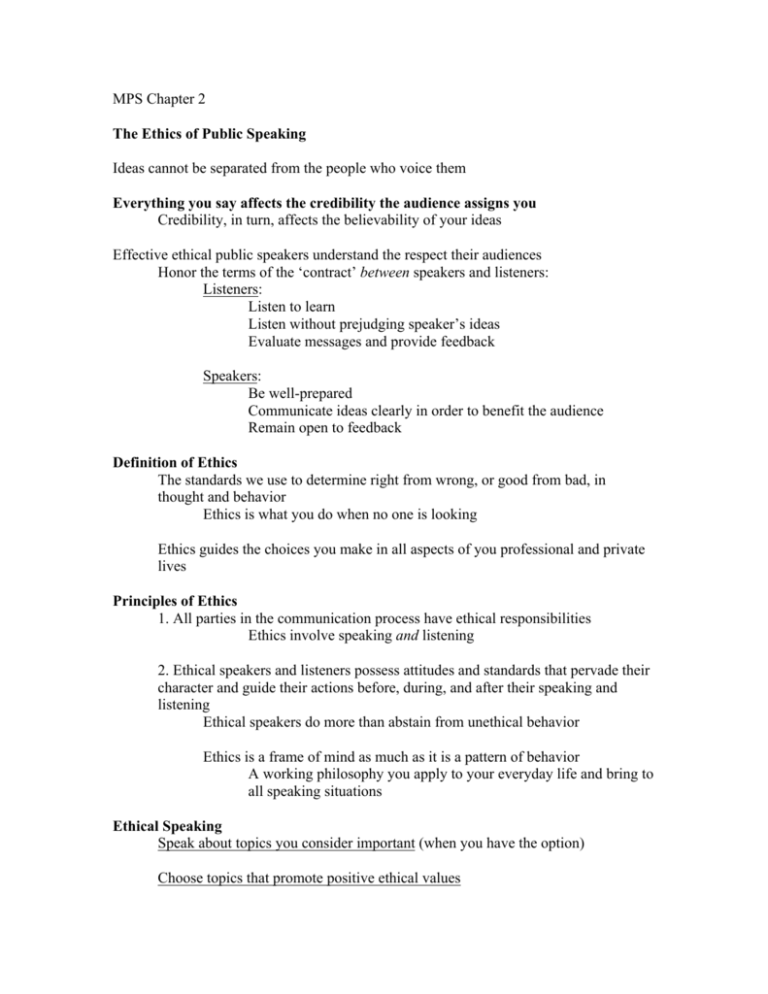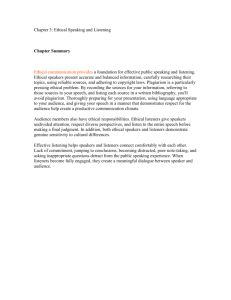The Ethics of Public Speaking
advertisement

MPS Chapter 2 The Ethics of Public Speaking Ideas cannot be separated from the people who voice them Everything you say affects the credibility the audience assigns you Credibility, in turn, affects the believability of your ideas Effective ethical public speakers understand the respect their audiences Honor the terms of the ‘contract’ between speakers and listeners: Listeners: Listen to learn Listen without prejudging speaker’s ideas Evaluate messages and provide feedback Speakers: Be well-prepared Communicate ideas clearly in order to benefit the audience Remain open to feedback Definition of Ethics The standards we use to determine right from wrong, or good from bad, in thought and behavior Ethics is what you do when no one is looking Ethics guides the choices you make in all aspects of you professional and private lives Principles of Ethics 1. All parties in the communication process have ethical responsibilities Ethics involve speaking and listening 2. Ethical speakers and listeners possess attitudes and standards that pervade their character and guide their actions before, during, and after their speaking and listening Ethical speakers do more than abstain from unethical behavior Ethics is a frame of mind as much as it is a pattern of behavior A working philosophy you apply to your everyday life and bring to all speaking situations Ethical Speaking Speak about topics you consider important (when you have the option) Choose topics that promote positive ethical values 2 Be sensitive to the play of circumstances and how they may affect what’s considered a ‘positive value’ in a given case Stealing may be justified in some cases Use truthful supporting material and valid reasoning Listeners have a right to know not only the speaker’s idea, but also the material supporting those ideas Ethical speakers are well-informed and should thus test the truthfulness and validity of their ideas Do not knowingly use false information or faulty reasoning Consider the consequences of your words and actions Ethical speakers have a respect for the power of language and the process of communication If you provide an audience with inaccurate information, you may contaminate the quality of their future decisions If you persuade someone to act in a particular way, you are, in part, responsible for the impact of the person’s new action Strive to improve your public speaking People who systematically study, and adopt proven precepts accept their obligation to communication responsibly in the communities of which they are a part Their ideas have value, are logically supported, and do not deceive their listeners Follow the principles for selecting, supporting, evaluating, organizing and delivering your ideas Doing so will instantiate your responsibility to be the best speaker you can possibly be Speakers have the opportunity to learn to speak well, and to be eloquent advocates of truth and justice If they fail to develop these abilities, they have not fulfilled their ethical obligation in a free society Ethical speech constitutes truthfulness, justness, and practical wisdom at all sites of freedom’s humane play It does not simply express the contents of one’s consciousness Rather: It brings into being, by means of expression, the social, political and economic environments—the deeply 3 cultured environments—where we live, learn, work, and play Ethical Listening Speakers do not shoulder their responsibilities alone Audiences have obligations as ethical listeners Again—speakers are listeners too, and the other way around You can not ‘not’ communicate Ethical listeners seek out speakers who may expand their knowledge, increase their understanding, introduce them to new ideas and challenge their beliefs Controversial speakers can expand your consciousness Ethical listeners listen openly without prejudging speakers or their ideas Listening without bias may require that we temporarily suspend impressions we have formed from the speaker’s past actions If you listen charitably you may have an opportunity change your impression of a person’s character affording them the freedom to be perceived as they may want to be perceived in the present, not in the prison of your past experience This may unburden the listener too—freeing her or him to redevelop a new and better relationship with another human being instead of bearing a grudge that precludes believing what the speaker is saying—that precludes adopting beliefs that may be edifying Ethical listeners evaluate the messages presented to them A listener who accepts a premise without evaluating its premise is like someone who buys a used car without looking under the hood The warning “let the buyer beware” is good advice not only for consumers of products, but also for consumers of messages Is each idea logically constructed? Is each idea supported with evidence that is relevant, sufficient, and authoritative? 4 Ethical listeners concern themselves with the consequences of their listening Listeners who assimilate only a part of speaker’s message because they fail to listen actively are responsible for the distorted message that results Fair Use Guidelines See: www.utsystem.edu/ogc/intellectualproperty/copypol2.htm The fair use provision: the fair use of a copyrighted work—“including such use by reproduction in copies or phonorecords or by any other means . . ., for purposes such as criticism, comments, news reporting, teaching (including multiple copies for classroom use), scholarship, or research—is not an infringement of copyright.” If you plan on using copyrighted material in a speech, ask the following questions: What is the character of the use I plan? If your intended use is personal, educational, or nonprofit, chances are it is fair use. Use of copyrighted material for purposes of criticism, commentary, or even parody weighs in favor of fair use. What is the nature of the work I plan to use? Use of a published work that merely reports facts weighs in favor of fair use. You need to seek permission, however, if you are planning to use an unpublished creative work, such as a story or a poem. How much of the work do I plan to use? Noncommercial use of a small portion of a copyrighted work—or even more than a small portion—likely qualifies as fair use. Commercial uses that exceed strict length limits, however, require permissions. If the use I plan were widespread, what effect would it have on the market value of the original? This question can become particularly important if you use copyrighted material in a presentation that is preserved electronically or transmitted by electronic means for distance learning. 5 Plagiarism Literary—or artistic or musical—theft. It is the false assumption of authorship: the wrongful act of taking a product of another person’s mind, and presenting it as one’s own. Delivering a speech is considered ‘publication’ Even if a speech has merely been delivered orally and not formally published, it is subject to copyright protection and may not be used without written permission You may plagiarize another’s ideas and organization of material e.g. if you give a speech on the five stages of dying without crediting Elisabeth Kubler-Ross, it’s plagiarism As a speaker you must always be on guard to credit the source of your ideas and their structure Plagiarism can be intentional and unintentional Intentional: knowingly Unintentional: the careless paraphrasing and citing of source material such that improper or misleading credit is given Sometimes occurs because of the common misconception that by simply changing a few words of another’s writing you have paraphrased the statement and do not need to cite it To avoid plagiarism: 1. Take clear and consistent notes while researching 2. Record complete source citations 3. Clearly indicate in your speech any words, ideas, examples, or organizational structures that are not your own 4. Use your own words, language style, and thought structure when paraphrasing 5. When in doubt, cite the source See http://owl.english.purdue.edu/handouts/print/research/r_paraphr.html for examples of plagiarized statements and legitimate paraphrases 6






